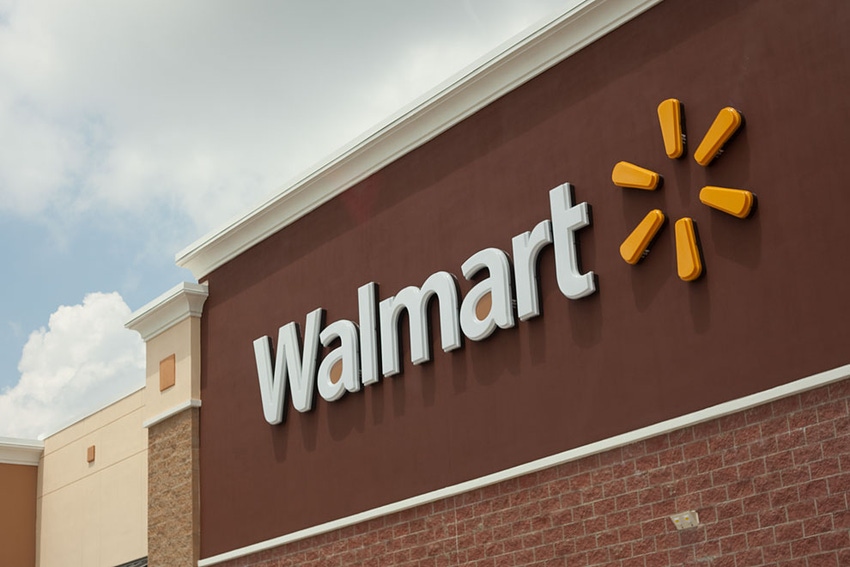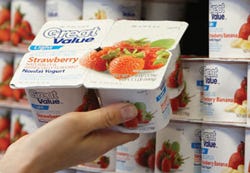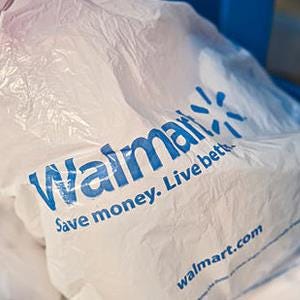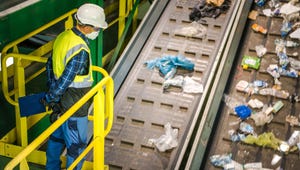While much coverage about Walmart is centered on wages and health benefits, there's also quite a bit attention regarding Walmart's Sustainability Index, a measurement system used to track the environmental impact of products.
September 18, 2013

While much coverage about Walmart is centered on wages and health benefits, there's also quite a bit attention regarding Walmart's Sustainability Index, a measurement system used to track the environmental impact of products.
In its latest update, Walmart said that the Index has been rolled out across 200 product categories, and to more than 1000 suppliers. By the end of this year, the company anticipates the Index will expand to include more than 300 product categories and as many as 5000 suppliers.
The retail giant claims that since the Index was rolled out more broadly in August 2012, it has shown a consistent trend of improved product sustainability. For example, Walmart's general merchandise department has improved its index product sustainability score by an average of 20%; with grocery department up by an average of 12%; and consumables and health and wellness rising an average of 6%.
 "With the Sustainability Index, Walmart is applying the science and research that we've developed to create a more sustainable supply chain globally," said Kara Hurst, CEO of The Sustainability Consortium, in a news release.
"With the Sustainability Index, Walmart is applying the science and research that we've developed to create a more sustainable supply chain globally," said Kara Hurst, CEO of The Sustainability Consortium, in a news release.
Based on the insights and data from the Index, Walmart has been working with suppliers, nonprofits, industry experts and government to develop and implement ideas that address critical "hot spots" and opportunities across the global supply chain.
One of the key areas involves increasing the use of recycled materials. For instance, more than 29 million tons of plastics are sent to landfills every year in the U.S. at a cost of about $6.6 billion annually.
Walmart says it aims to grow both the supply and demand for recycled plastics so they can be diverted from landfill and get a second life. The company is working with cities to increase plastic recycling and with suppliers to increase the use of recycled content and make packaging more recyclable. The company said that changes in packaging are already being implemented in product categories such as beverage, over-the-counter drugs, dairy creamers and berry containers.
One of the biggest initiatives Walmart undertook for packaging involved its packaging scorecard.
"I don't believe Walmart at the time foresaw the size of the impact," Ron Sasine, senior director of packaging for Walmart, told PlasticsToday last year. "We knew we were providing tools others might use and said, at the time, we were developing something that we want the industry to feel free to benefit from. But the scale and size of impact has been larger than we anticipated."
The Walmart packaging scorecard is a measurement tool that forced suppliers to evaluate themselves relative to other suppliers, based on specific metrics. The scorecard evaluates many environmental attributes of packaging, including greenhouse gas reductions, substrate material choices, and chemical composition.
In a column on our sister publication, Packaging Digest, Sasine wrote that last year, the company reached a goal they set back in 2007 - to reduce packaging in the products they sell by 5% by 2013.
In the article, he said one of the successes of the packaging scorecard included packaged salads, where the company was able to cut plastic resin by an average of 40%, amounting to more than 1.2 million lb of plastic film.
Plastic bag lawsuit
Of course, you can't talk about a grocery/retail chain and plastics and not mention - what else - plastic bags. Whether you love them or love to hate them, the reality is plastic bags are still there. Walmart has a goal to eliminate landfill waste generated by its U.S. operations by 2025, and in 2010, the retail giant reduced the plastic bag waste across its global operations by 47.95 million lb, or approximately 3.5 billion bags.
In response to complaints about plastic bags and waste, Walmart made it a priority to lightweight its plastic bags. But a lawsuit by a man in eastern Nebraska claims that the failure of an overfilled plastic shopping bag led to the death of his wife, according to an article in the AP.
according to an article in the AP.
The lawsuit was first filed in February by widower William Freis, of Plattsmouth, in Sarpy County but has since been moved to U.S. District Court in Omaha, the Lincoln Journal Star reports.
The wrongful death suit alleges the bag failed on April 16, 2010, outside a Walmart store in the Omaha suburb of Bellevue. The lawsuit claims a cashier placed two 42-ounce cans of a La Choy product and a 2-lb bag of rice in a single bag.
The bag broke as Freis' wife carried it to her car and one of the cans fell on her right big toe, cutting and fracturing it. The injuries "led to an infection that spread through her body and, despite antibiotics, hospitalizations and two surgical procedures, ultimately resulted in her death on March 12, 2011."
The lawsuit faults Walmart for a failure to "properly train its employees on filling the bags or when double-bagging should be employed."
The suit also named Hilex Poly, the bag manufacturer and Bunzl Distribution, the provider of the bag, alleging the bag was defective.
The lawsuit seeks nearly $657,000 for medical and funeral expenses, in addition to an unspecified amount for her pain and suffering and the loss to her husband, the AP reports.
A Walmart spokesman told the Lincoln Journal Star that the company is looking at the allegations and will respond in court. "Customer safety is a top priority, and we take it seriously anytime an injury is reported in one of our stores," the spokesperson said.
About the Author(s)
You May Also Like


